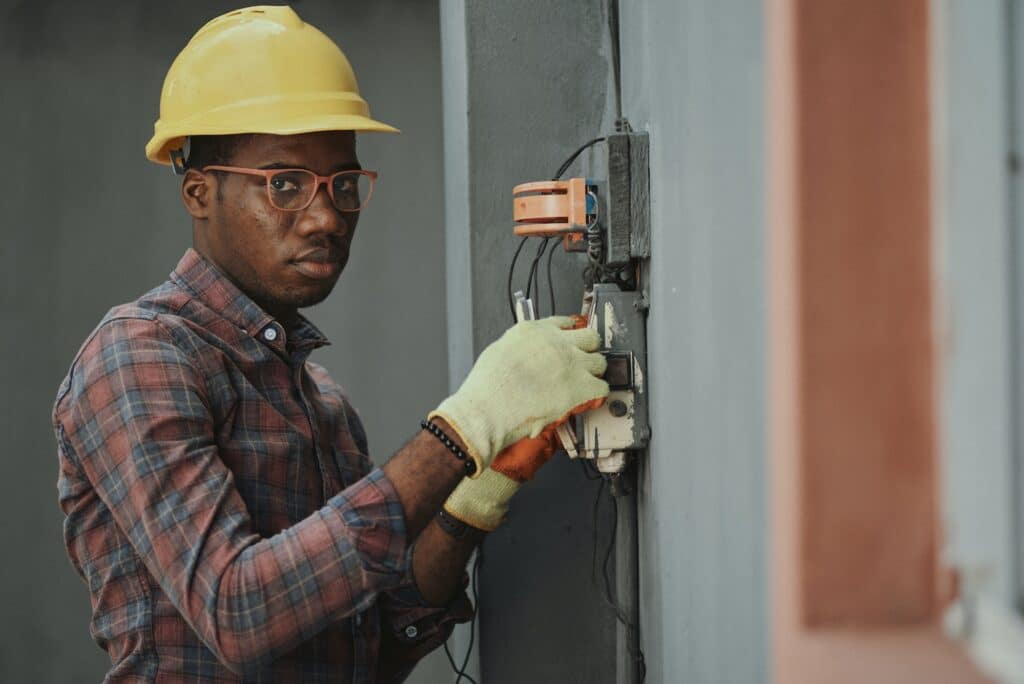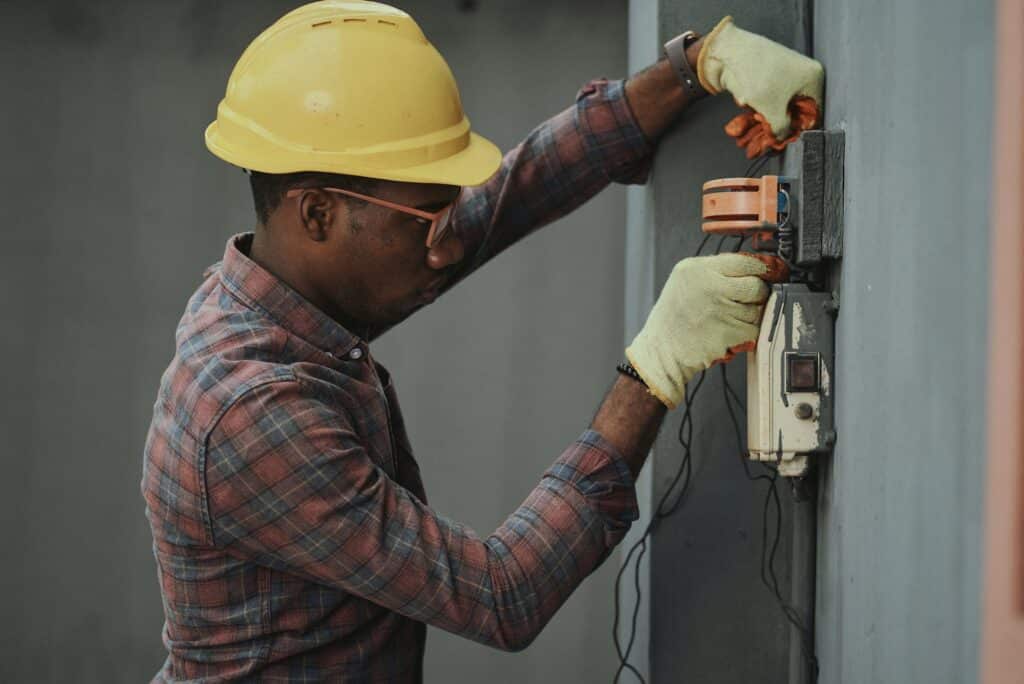Electricians are the skilled professionals responsible for installing, maintaining, and repairing electrical systems that power our homes, businesses, and industries. As a cornerstone of modern infrastructure, electricians play an indispensable role in ensuring the smooth operation of our daily lives.
As businesses and households rely heavily on electricity, hiring a qualified electrician becomes a strategic move to ensure uninterrupted functionality and safety. This blog delves into the essential aspects of hiring an electrician, from evaluating their technical prowess and soft skills to crafting the right job description and conducting insightful interviews. We will explore ways to assess an electrician’s skills on the job, discuss where to find reputable electricians, and shed light on the costs associated with their services. By the end, you’ll be equipped with the knowledge to make informed decisions, avoiding mis-hires and ensuring that the selected electrician contributes effectively to your company’s growth.
What is the role of an electrician?
An electrician is a skilled professional responsible for designing, installing, repairing, and maintaining electrical systems. From residential homes to commercial establishments, electricians play a pivotal role in ensuring a reliable and safe supply of electricity. Their expertise extends beyond simply connecting wires; electricians analyze electrical diagrams, troubleshoot faults, and stay updated with safety codes to prevent hazards.
In the context of a company’s growth, electricians are essential in maintaining operational efficiency. They ensure machinery, equipment, and lighting systems function optimally, minimizing downtime and increasing productivity. Here’s a breakdown of their key tasks:
- Installing electrical systems and wiring.
- Inspecting and maintaining electrical components.
- Diagnosing issues and repairing faulty systems.
- Collaborating with engineers and architects for new constructions.
- Upgrading electrical systems to meet safety standards.
- Ensuring compliance with local and national electrical codes.
- Enhancing energy efficiency through technology.
In essence, electricians empower businesses by creating a safe and functional electrical environment, which in turn, drives productivity, customer satisfaction, and overall growth.
Hard skills to assess in an electrician
Assessing the hard skills of an electrician is a critical step in ensuring you hire a capable professional for the job. Here are the key technical competencies to look for and effective ways to evaluate them:
Electrical System Installation: Evaluate the candidate’s proficiency in safely installing various electrical components, from outlets to circuit breakers. Ask about their experience with different types of wiring systems.
Blueprint Reading: Gauge their ability to interpret electrical diagrams and blueprints accurately. Present them with a sample blueprint to discuss how they would approach a specific installation.
Troubleshooting and Diagnostics: Inquire about their problem-solving skills. Pose hypothetical electrical issues and ask how they would diagnose and rectify them step-by-step.
Safety Protocols: Probe their knowledge of safety regulations and protocols. Ask about measures they take to prevent electrical hazards and ensure a secure working environment.
Testing Instruments: Discuss their familiarity with testing tools such as multimeters and voltage testers. Inquire about their experience in using these tools to assess electrical conditions.
Code Compliance: Assess their understanding of local and national electrical codes. Pose scenarios to see how they ensure compliance when installing or repairing electrical systems.
Equipment Handling: Inquire about their experience with specialized equipment such as conduit benders, wire strippers, and crimping tools. A skilled electrician should be well-versed in their usage.
Energy Efficiency Knowledge: Ask about their awareness of energy-efficient technologies and practices. A forward-thinking electrician can contribute to reducing energy consumption in electrical systems.
To assess these hard skills effectively, consider using a combination of technical tests, practical demonstrations, and scenario-based questions during the interview process. This comprehensive evaluation ensures that the selected electrician possesses the technical prowess necessary to excel in the role.
Soft skills to assess in an electrician
While technical proficiency is crucial, assessing the soft skills of a potential electrician is equally important. These interpersonal and behavioral traits contribute to a harmonious work environment and effective collaboration. Here are the key soft skills to evaluate when hiring an electrician:
Communication Skills: An electrician needs to convey information clearly to team members, clients, and supervisors. During the interview, observe how effectively they explain technical concepts and respond to questions.
Problem-Solving Abilities: Electricians often encounter unforeseen challenges. Assess their ability to think on their feet, adapt to evolving situations, and devise innovative solutions to complex problems.
Attention to Detail: Precision is paramount in electrical work. Inquire about instances where their attention to detail prevented errors or hazards. Their response will highlight their commitment to accuracy.
Time Management: Electrical projects have deadlines. Ask about their strategies for managing time and meeting project milestones without compromising quality.
Teamwork and Collaboration: Electricians frequently collaborate with other professionals. Inquire about their experience working within diverse teams and their approach to resolving conflicts.
Customer Service Orientation: For electricians who interact with clients, strong customer service skills are essential. Ask about experiences where they effectively communicated with clients and addressed concerns.
Adaptability: The electrical field is ever-evolving. Discuss their willingness to learn new technologies and techniques, highlighting their openness to continuous improvement.
Safety Consciousness: A safety-conscious electrician prioritizes the well-being of themselves and others. Inquire about their commitment to following safety protocols and their understanding of potential risks.
To evaluate these soft skills, use behavioral interview questions that prompt candidates to share real-life examples of how they’ve demonstrated these attributes in their previous roles. Additionally, consider seeking references to gain insights into their interpersonal dynamics and work ethic. By assessing both technical proficiency and soft skills, you’ll ensure you’re hiring an electrician who not only excels in their craft but also contributes positively to your team and company’s growth.

How to test an electrician’s skills
Testing an electrician’s skills is a pivotal step in the hiring process, ensuring you bring on board a competent professional. Utilizing specific technical tests offers valuable insights into a candidate’s practical abilities. Here are some essential tests and their significance:
Wiring and Circuitry Test: This hands-on assessment evaluates the candidate’s capability to correctly install and connect wiring systems. It highlights their familiarity with different wiring types, ensuring they can efficiently set up electrical circuits.
Troubleshooting Simulation: Presenting a simulated electrical issue tests the candidate’s diagnostic skills. Their approach to identifying and rectifying the problem provides insight into their problem-solving prowess under real-world conditions.
Blueprint Analysis: Providing a complex electrical blueprint assesses their ability to decipher technical diagrams. Their understanding of circuit layouts and connections reflects their proficiency in interpreting design plans.
Practical Wiring Exercise: Assigning a practical task, like wiring a switchboard or installing outlets, reveals their dexterity with tools and adherence to safety guidelines. It showcases their attention to detail and craftsmanship.
Safety Protocol Assessment: A written or scenario-based safety assessment examines their knowledge of safety measures and precautions. This is crucial to ensure they prioritize safety while working with electricity.
Technical Knowledge Quiz: A series of technical questions assess their theoretical understanding of electrical concepts. This test provides insight into their foundational knowledge, supporting their practical skills.
These tests are essential as they provide objective evidence of a candidate’s proficiency, confirming their capabilities beyond their claims on a resume or in an interview. By evaluating both theoretical knowledge and practical application, you can confidently select an electrician who not only possesses the requisite skills but can also effectively apply them in real-world scenarios.
Where to find the best electricians
Finding the best electricians to fill your job opening requires a strategic approach to sourcing candidates from various platforms. Here’s how to tap into the right resources to identify the ideal candidate for your electrician role:
Online Job Portals: Websites like Indeed, LinkedIn, and Glassdoor offer vast databases of potential candidates. Craft a detailed job description outlining technical and soft skill requirements to attract relevant profiles.
Trade Associations: Industry-specific organizations often have job boards or directories of skilled professionals. Connecting with these associations can lead you to electricians who are proactive in their field.
Local Trade Schools and Colleges: Collaborate with educational institutions offering electrical training programs. Their career services departments may have a pipeline of fresh graduates or experienced professionals.
Referrals: Encourage your current employees or network connections to refer electricians they have worked with or know personally. Referrals often yield candidates who align well with your company culture.
Social Media Platforms: Leverage platforms like LinkedIn, Facebook groups, and industry forums to post job openings. Engage with the electrician community and tap into their networks.
Contractor Networks: Partnering with local electrical contractor networks can lead to skilled candidates seeking new opportunities. These networks often have established connections within the industry.
Job Fairs and Trade Shows: Attend relevant industry events where you can interact directly with potential candidates. This provides a chance to gauge their communication skills and enthusiasm.
Recruitment Agencies: Engage specialized recruitment agencies familiar with the electrical field. They can help identify pre-screened candidates who match your requirements.
By diversifying your approach and utilizing these platforms strategically, you increase your chances of finding the best-suited electricians for your company. Remember, a comprehensive sourcing strategy not only attracts talent but also ensures a seamless integration of skilled professionals into your workforce.
Electrician job description template
About Us: [Company Name] is a dynamic and innovative [industry/sector] company that prides itself on delivering high-quality electrical solutions. As a leader in [specific field or industry], we are dedicated to excellence and seek a skilled Electrician to join our team and contribute to our continued success.
Responsibilities:
- Install, maintain, and repair electrical systems, equipment, and fixtures according to local and national codes.
- Diagnose electrical problems and implement effective solutions to ensure optimal functionality.
- Collaborate with engineers, architects, and other team members to plan and execute electrical installations.
- Perform routine inspections of electrical systems, identifying and addressing potential hazards or issues.
- Update electrical systems to meet current safety and energy efficiency standards.
- Ensure all work adheres to company policies, safety regulations, and industry best practices.
Qualifications:
- Proven experience as an Electrician, with a solid understanding of electrical systems and components.
- Valid electrical license or certification as required by local regulations.
- Proficient in reading blueprints and technical diagrams.
- Strong troubleshooting skills and the ability to work independently or as part of a team.
- Knowledge of safety protocols and practices related to electrical work.
- Excellent communication skills to liaise with team members and clients effectively.
Why join us?
- Opportunity to work with a dynamic team that values innovation and growth.
- Engaging projects that challenge and enhance your skills.
- Collaborative work environment that promotes continuous learning.
- Competitive compensation package and benefits.
- Commitment to safety and compliance, ensuring your well-being.
Benefits:
- Competitive salary commensurate with experience.
- Comprehensive health and dental insurance.
- Retirement savings plan with company matching.
- Paid time off and holidays.
- Professional development opportunities.
Application Process: To apply, please submit your resume and a cover letter outlining your relevant experience and why you’re interested in joining [Company Name]. Qualified candidates will be contacted for further steps in the selection process.
Important information:
- Location: [City, State]
- Employment Type: [Full-time/Part-time]
- Experience Level: [Entry-Level/Mid-Level/Experienced]
- Industry: [Industry/sector]
- Application Deadline: [Date]
We look forward to reviewing your application and welcoming you to our team at [Company Name].
You can customize this job description template to align with your company’s specific values, industry, and job requirements.

How much does an electrician cost?
In the US market, electrician costs can vary based on factors like experience and skills. On average, apprentice electricians command an hourly rate of around $14 to $20, while journeyman electricians with mid-level experience earn approximately $25 to $35 per hour. Master electricians, possessing extensive expertise, can charge $35 to $45 per hour. For specialized skills such as industrial automation or renewable energy, rates can range from $40 to $60 per hour. Keep in mind that these figures can differ based on location, demand, and specific project requirements.
Electrician interview questions
Asking the right interview questions is crucial to ensure you find the best-suited electrician for your team. Here’s a breakdown of 15 questions categorized by soft skills, hard skills, and general skills to thoroughly assess candidates:
Soft skills:
- Communication: How do you ensure effective communication with team members and clients during a project? Share an instance when clear communication prevented misunderstandings.
- Problem-Solving: Describe a challenging electrical issue you faced. Walk us through your approach to troubleshooting and resolving the problem.
- Adaptability: How do you stay updated with new electrical technologies and industry changes? Can you provide an example of when you successfully adapted to a new technology?
Hard skills:
- Blueprint Interpretation: How comfortable are you with reading and understanding electrical blueprints? Can you explain how you would translate a complex diagram into a practical installation?
- Wiring Proficiency: Walk us through the steps you take when installing a new wiring system. What safety precautions do you prioritize during this process?
- Troubleshooting Experience: Can you narrate a situation where you were tasked with diagnosing a complex electrical issue? How did you identify the problem and implement a solution?
General skills:
- Certifications and Licenses: Could you provide details about your relevant certifications and licenses? How do you ensure you stay compliant with industry regulations?
- Safety Awareness: How do you prioritize safety when working on electrical systems? Can you share an example of a safety measure you always adhere to?
- Time Management: How do you manage your time when working on multiple projects simultaneously? Can you discuss a situation when effective time management contributed to project success?
Behavioral questions:
- Team Collaboration: Describe a time when you had to collaborate with other trades or team members on a project. How did you ensure seamless coordination?
- Client Interaction: Can you share an experience where you successfully communicated complex electrical concepts to a non-technical client? How did you ensure their understanding?
- Conflicts Resolution: Describe a conflict you encountered on a project and how you resolved it while maintaining professionalism and productivity.
Wrapping up:
- Continuous Learning: What steps do you take to stay updated with the latest trends and advancements in the electrical field?
- Projects Showcase: Could you present a notable project you’ve worked on, highlighting the technical challenges you overcame and your contributions to its success?
- Safety Prioritization: In your opinion, what’s the most critical safety protocol an electrician should never overlook? How do you ensure it’s consistently followed?
These questions offer a comprehensive view of candidates’ skills, expertise, and compatibility with your team’s dynamics. They help you make informed decisions when selecting the electrician who best aligns with your company’s needs and growth objectives.
Assess for an electrician to avoid mis-hires
Hiring the right electrician is a critical decision that impacts your company’s productivity and safety. Implementing thorough electrician assessment can significantly reduce the risk of mis-hires, ensuring you welcome only the most qualified professionals to your team.
By incorporating specialized assessments, you streamline the hiring process. These assessments provide tangible evidence of a candidate’s technical aptitude, ensuring they possess the requisite skills beyond just verbal claims. Precise evaluation methods save time and resources by swiftly identifying top candidates while minimizing the chances of bringing in unsuitable hires.
Looking for a reliable talent assessment tool? Consider leveraging Testlify. With its comprehensive array of tests tailored for electrician roles, Testlify offers an efficient solution to evaluate both hard and soft skills. From wiring simulations to safety protocol scenarios, Testlify helps you make informed decisions about candidates’ capabilities.
Ready to Elevate Your Hiring Process? Schedule a free 30-minute live demo with Testlify Today. Discover how our assessments can enhance your talent acquisition strategy and lead you to the perfect electrician for your team.






